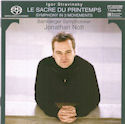 Stravinsky - Le Sacre du Printemps
Stravinsky - Le Sacre du Printemps
Bamberger Symphoniker; Jonathan Nott
Tudor 7145
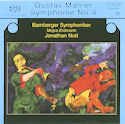 Mahler - Symphony No.4
Mahler - Symphony No.4
Mojka Erdmann; Bamberger Symphoniker; Jonathan Nott
Tudor 7151
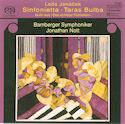 Janáček - Sinfonietta; Taras Bulba
Janáček - Sinfonietta; Taras Bulba
Bamberger Symphoniker; Jonathan Nott
Tudor 7135
Nestled near the remote eastern border of Bavaria, Bamberg is the home of an orchestra founded in 1946 from the post-war remnants of the former German Philharmonic of Prague. It was lead for many years by old school worthies including Joseph Keilberth, Eugen Jochum and Horst Stein. The English conductor Jonathan Nott, best known for his devotion to contemporary music through his work with Ensemble Modern and IRCAM's Ensemble Intercontemporain, assumed the directorship in 2000 and has since energized the orchestra, introducing more contemporary repertoire and touring with it throughout the world to critical acclaim. Recently the Swiss-based Tudor records, in conjunction with the Bavarian Radio network, began distributing recordings of the orchestra in the audiophile SACD format.
The orchestra ably demonstrates its prowess and keen rhythmic precision in a hard-driven performance of Stravinsky's Rite of Spring, coupled with a surprisingly genial interpretation of that composer's Symphony in Three Movements. Nott seems to me to be less convincing in the Mahler disc (part of a projected complete cycle), where his use of rubato is not fully thought out, though otherwise quite engaging. The Janáček disc is the most problematic, largely due to the manipulation of the SACD soundstage by the producer of these albums, Bernhard Albrecht, whose stated intent is to produce a centred sound as heard from the conductor's perspective, with little sense of the ambience of the concert hall. Consequently the antiphonal effects of the eleven trumpets in the Sinfonietta, as well as the organ passages in Taras Bulba, fail to make much impact in conventional stereo. In addition, the close microphone placement and mixing-board manipulations consistently rob the performances of dynamic nuances. Fans of the SACD format (I'm not one of them) may be willing to trade these shortcomings for their surround-sound glories.
Daniel Foley
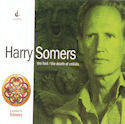
Harry Somers - The Fool; Death of Enkidu
Various artists
Centrediscs CMCCD14209
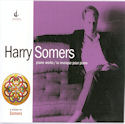 Harry Somers - Piano Works
Harry Somers - Piano Works
Darrett Zusko; Karen Quinton; Jacinthe Couture; Reginald Godden; Paul Helmer; Andre-Sebastien Savoie; John McKay; Antonin Kubalek
Centrediscs CMCCD 14509
Harry Somers is so often referred to as the leading composer of his generation in Canada that I have to wonder why his music is heard so rarely. But these new sets in the ongoing Somers Recording Project should help change that.
Somers was 28 when he wrote his opera The Fool in 1953. It is an eclectic work. But Somers was acutely sensitive to both the meaning and sounds of Michael Fram's text, so never let his various vocal techniques get in the way of the words. There's a great deal of earnest discussion about freedom, and the constraints placed on it by the rule of law. But for me the most effective passage occurs when the King and the Fool step aside from their conversation. Each admits to himself what he really wants to hear from the other about the Fool's plan to jump off a tower to his certain death. But they can't tell each other, and the results are tragic.
As the Fool, Darryl Edwards handles Somers' demanding vocal lines with charm and fluency. Gary Relyea brings much-needed warmth to his role as the King, his mellifluous bass-baritone managing to sound both authoritative and vulnerable. Tamara Hummel and Sandra Graham are terrific, and the instrumental ensemble under David Currie shines, with Roman Borys' cello a standout.
The Death of Enkidu was written twenty-four years later. Here Somers responds to the mythological story, based on the ancient Mesopotamian Epic of Gilgamesh, with colouristic effects. But Martin Kinch's libretto, set in both English and ancient Akkadian, fails to reveal the dramatic heart of the tale. In fact, Somers' score is at its most vital in the passages of wordless chant. David Pomeroy brings character to the role of Enkidu and Julie Nasrallah - familiar to CBC listeners as the host of Tempo - is a moving Old Woman. Les Dala leads the capable ensemble.
This series is being called "A Window on Somers", and indeed the collection of his solo piano music offers a view of the composer at his most personal. These nine works - even the grandiose Sonata no. 3, here stylishly played by André-Sébastien Savoie - all sound distinctly intimate.
At the same time they present a mystery. Why did Somers stop writing solo piano music when he was just thirty-two years old? Following the fifth sonata, there was nothing for forty years. Then two years before his death in 1999, Somers was enticed back by the young Canadian pianist Darrett Zusko, who gives a characterful performance of Somers' last piano work, Nothing Too Serious. Of the earlier pieces, Reginald Godden, who was Somers' own piano teacher, is represented here by an elegant performance of the virtuosic first sonata, Testament of Youth. Antonin Kubalek gives a memorable performance of the Sonata no. 5, conveying a keen sense of its dramatic momentum.
These two important new sets leave me hoping for the future release on CD of Somers' iconic opera Louis Riel - whether in a new performance, or even the original recording which has been unavailable for far too long.
Pamela Margles



